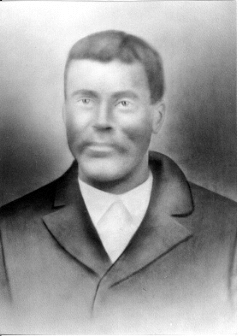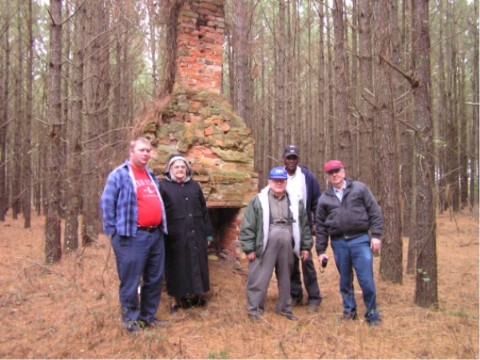 Ned Edmund Autry (1854 – 1929) | I don’t know who Ned Edmund Autry’s father was but his mother’s name was Edith Herring-Johnson. Edith and her family of 1870 lived in a household (212) that was located near her mother and older brother’s home (213). Edith’s mother’s name was Phyllis Herring and her older brother’s name was Archie Herring. Their homes were located somewhere close to where aunt Ada’s present day home is located. As a matter of fact, other than Edith, Gabe Powell and his first wife Julia who I think was also one of Phyllis’ daughters were some of Phyllis and Archie’s closest neighbors in 1870. Gabe’s old place (216) of 1870 on was in “hollerin” distance of aunt Ada’s present day home. Click here view the 1870 Bladen County information. Notice the house numbers 212-216. |
I also found that Shade Herring who was born in 1855 and was found as a youth living in the Longview area of Sampson County was also a residence of this community in 1880. He returned to the Longview area by 1900 to live there for the remainder of his days. At this moment I do not know what his relation was to Phyllis, Archie, Edith or Ned. I know many of Shade’s present day descendants including two that were also called Shade Herring (father and son) who also lived in the Longview area of Sampson County.
In all the information that I found on Edith and her mother Phyllis, they were listed as widows but Edith continued to have children all through the 1870’s and 80’s. I have learned through my readings on slavery that just because a woman was listed as being a widow didn’t necessarily mean her husband had met his death. Since It was against the law for slaves to be married some slaves cohabited and had children with multiple partners. When slavery was ended the newly freed parties had to choose who they wanted to marry and call their spouse. The mate not chosen would then be know as a widow or widower until or if they married. I have also ran across information that showed a woman to be called a widow if her man was sold off to some other place during slavery and she never married after slavery. At this time I have no idea which of these three cases applies to Phyllis and Edith.
Note: There is another possibility and it gets my elder relatives on the edge when I even hint at the idea. What if Edith was involved with her slave master or some of his relatives? For the longest time I have been thinking that Edith’s last five children were fathered by some of Joel Jr. Johnson’s sons, especially her former slave owner Owen who was the same age as she was. Most of her children has been listed as mulatto at one time or another and I am at odds as to how Edith could have still been listed as a widow in 1880 with an addition of four more children birthed by her by then and one after. Also, for some reason Owen was more than generous about giving Edith’s children land that was part of his estate before his death. I plan to research all of this sometime in the future.
Somehow Phyllis, her daughter Edith and Ned Edmund were closely related to Ned Edward Autry’s family of the McDaniels township of Sampson County. Click here for a page of additional information that mentions some of my findings and thoughts on this. Their true relation will soon be known for I am awaiting information that I hope will unravel this mystery.
Ned Edmund was suppose to have been born sometime around 1854 and was the only child of Edith’s that was listed with the surname of Herring. All of her other children were found to be using the surname of Johnson. I first found Ned in 1870 living with a white family as their servant in the Colly township of Bladen County NC somewhere between what is now the Susie Sandhill and the Barnes brother’s blueberry farm. He was listed as being 10 years old and was called Ned Herring at that time. Currently, none of Ned’s 3rd generation of living descendants, his grandchildren, will acknowledge that he was born a Herring instead of an Autry. It seems to anger them when word is mentioned that Ned was not truly an Autry.
The white family that Ned was living with during that time was the family of Owen and Margarette Johnson’s. Owen was the son of Joel Johnson Jr. who was the brother of Daniel Johnson. Daniel was the slave owner of Ned’s father-in-law, Henry Johnson, before slavery was legally ended. Here is a list of Owen and Margarette’s children.
1 Luella Johnson born abt. 1867
2 Robert L Johnson born abt. 1869
3 Julius W Johnson born abt. 1873
4 Thomas J Johnson born abt. 1874
5 Mary P Johnson born abt. 1879
I haven’t been able to find out anything about the servant system that was used after slavery was legally terminated. I don’t know if Ned could have been paid or was just provided a meal and shelter for his services. Or Maybe his mother could have received payment for services rendered by him.
This photo shows all that is left of the Johnson homestead which is located in the same area where Ned Edmund lived as a youngster. The people in the picture are descendants of Owen Johnson and one of Ned’s grandsons, Winston Whitted who showed them how to find this place.
In 1880 Ned was found living in the household of Jas. B Mulfore and his wife Susan, another white family living in the Colly township of Bladen County NC. He was still employed as a servant and his name was listed as Ned Edmund Autry. Autry being a surname that he apparently assumed or liked. Some of the elders of the family says that his father was a man that used the surname of Autry. If so he did not live in Bladen County.
In some information of 1880 Ned was found to be listed as a mulatto. From looking at the photo of Ned in the guestbook you can clearly tell that there is an immediate line of Caucasian blood in his ancestry. In other words, I think one of his parents or one or more of his grandparents were close to 100% Caucasian.
Sometime between 1880-1882 Ned met and married Mary Carlton Johnson. (Carlton being her middle name representing her mother’s maiden name). Shortly after 1880 Mary moved to the Turnbull township of Bladen County from the Warsaw township of Duplin County NC with her father, Henry Johnson and her brother’s Toney Troy and George Johnson. After Ned’s marriage to Mary they began what was to become a very large family and they lived in the Colly township of Bladen County for the rest of their natural lives.
Ned was listed as being a farmer during his adult life and it has been said that he had been a very profitable man. I have even heard that he was able to buy new trucks way back in the day. Somebody and I don’t remember who, told me that in his latter years he even became a preacher of the gospel.
Click here for information about Ned’s brothers and sisters.